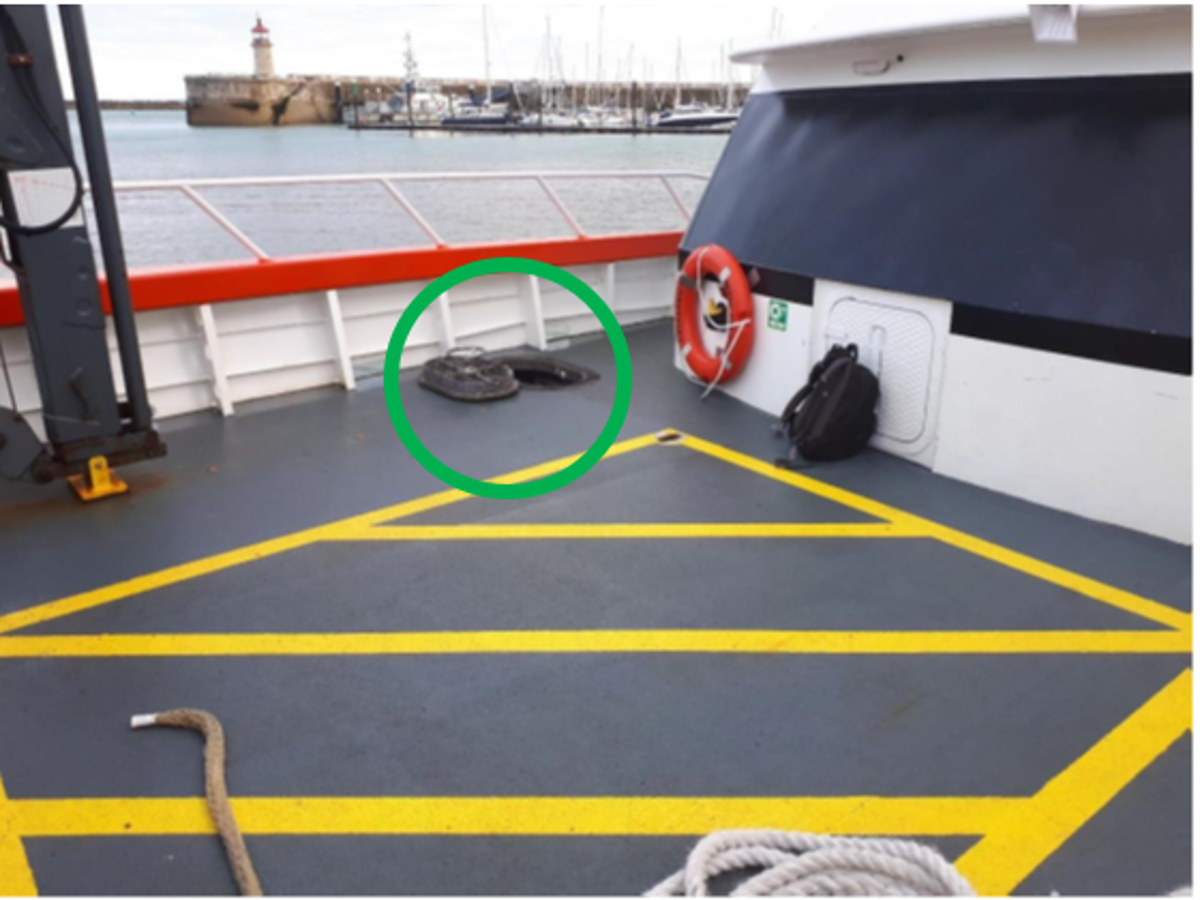LTI: Step into open deck hatch causes fall
- Safety Flash
- Published on 10 January 2020
- Generated on 3 January 2026
- IMCA SF 02/20
- 3 minute read
Jump to:
What happened?
During personnel transfer operations on an offshore renewables crew transfer vessel (CTV), a deckhand stepped backwards into an open hatch and fell, resulting in an injury.

Before the incident the CTV was on standby in the field and the two-man crew were doing maintenance in the starboard hull, with the forward and aft hatches open. As the handheld VHF signal was obstructed inside the hull, the call for personnel transfer was not heard. The CTV crew were informed by another CTV and made aware of their call. The crew finished their maintenance and mobilised for the personnel transfer. At this point, only the aft hatch was closed.
Just after the personnel transferred aboard, the deckhand, who was receiving the cargo transfer of luggage, stepped backwards into the open hatch with one foot. In order to try and save himself from falling into the void space, he used his right arm/shoulder on which he landed, resulting in his injury.
The flotel medic boarded the CTV to assess the deckhand; the CTV subsequently went to port to transfer the injured person to hospital for assessment. He dislocated and fractured his right shoulder resulting in an LTI. Our member notes that this incident had the potential to have caused permanent injuries or a fatality.
What were the causes?
The direct cause – what went wrong – was that the deckhand stepped backwards and did not see, and thus fell into the open hatch.
Underlying causes identified:
- Because of miscommunication between the two crew members, only the aft hatch was closed.
- The forward hatch was left open when the lifting operations started. There were no barriers around the hatch. The outside of the hatch was marked yellow and was clearly distinguishable from the deck when closed. However, there are no proper markings or distinct colour on the inside of the hatch and as a result the hatch is less clearly distinguished when opened.
- VHF radios were used for communication when outside the wheelhouse; when working inside the vessel hull, reception is lost.
- Risk assessments for this particular task were not adequate.
- Due to the 24-hour operations, ‘pre- and post-sailing checks’ were not being executed at all times. These need to be executed at least prior to sailing away after mooring or maintenance activities.
- It is believed and confirmed that the crew felt pressure to finalise their work, unmoor and mobilise quickly.
Action
- Amend risk assessments to include all relevant preventive measures (including responsibilities for lifting, and deck checks prior to lifting operations and clear means of communication).
- Provide distinct (colour) marking on the inside of the hatches to make them easily distinguishable when open.
- During 24hr operations, time for maintenance should be scheduled in;
- Investigate improvement measures for radio communications when working in the engine room.
- Reiterate lesson ‘time pressure should be prevented and in case it does occur unexpectedly; this should not lead to rushing or taking short cuts’.
- Reiterate ‘stop work authority’.
Related Safety Flashes
-
IMCA SF 27/16
12 October 2016
-
IMCA SF 20/15
3 December 2015
-
IMCA SF 08/08
24 April 2008
IMCA Safety Flashes summarise key safety matters and incidents, allowing lessons to be more easily learnt for the benefit of the entire offshore industry.
The effectiveness of the IMCA Safety Flash system depends on the industry sharing information and so avoiding repeat incidents. Incidents are classified according to IOGP's Life Saving Rules.
All information is anonymised or sanitised, as appropriate, and warnings for graphic content included where possible.
IMCA makes every effort to ensure both the accuracy and reliability of the information shared, but is not be liable for any guidance and/or recommendation and/or statement herein contained.
The information contained in this document does not fulfil or replace any individual's or Member's legal, regulatory or other duties or obligations in respect of their operations. Individuals and Members remain solely responsible for the safe, lawful and proper conduct of their operations.
Share your safety incidents with IMCA online. Sign-up to receive Safety Flashes straight to your email.